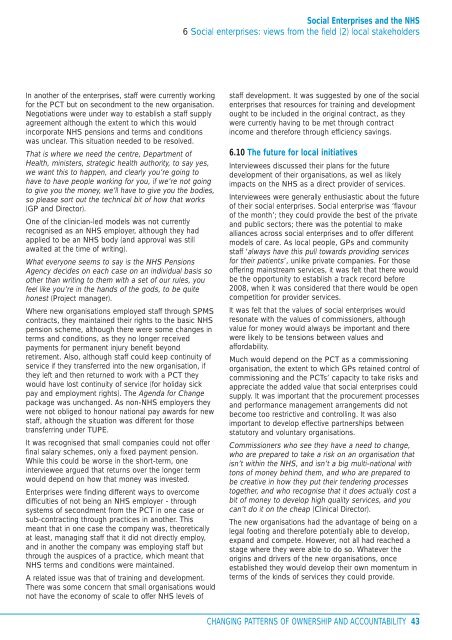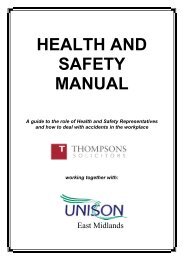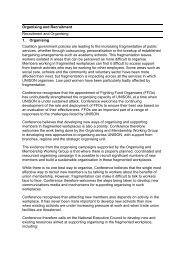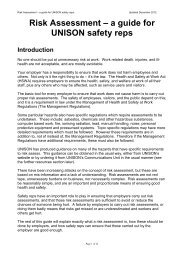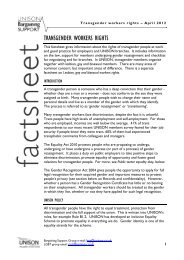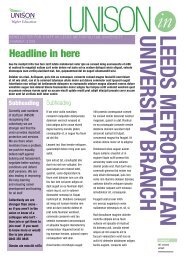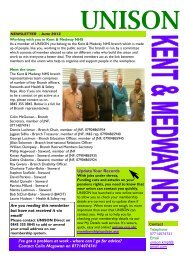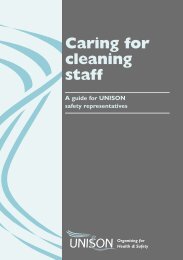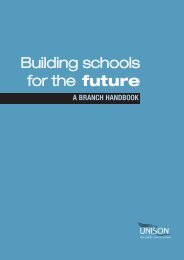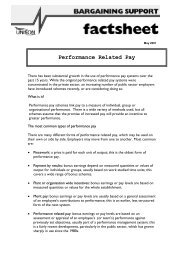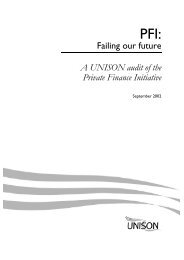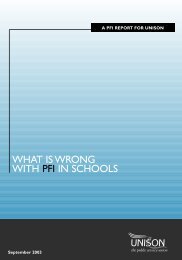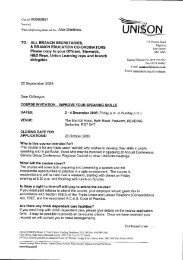Social Enterprises and the NHS - Unison
Social Enterprises and the NHS - Unison
Social Enterprises and the NHS - Unison
You also want an ePaper? Increase the reach of your titles
YUMPU automatically turns print PDFs into web optimized ePapers that Google loves.
In ano<strong>the</strong>r of <strong>the</strong> enterprises, staff were currently working<br />
for <strong>the</strong> PCT but on secondment to <strong>the</strong> new organisation.<br />
Negotiations were under way to establish a staff supply<br />
agreement although <strong>the</strong> extent to which this would<br />
incorporate <strong>NHS</strong> pensions <strong>and</strong> terms <strong>and</strong> conditions<br />
was unclear. This situation needed to be resolved.<br />
That is where we need <strong>the</strong> centre, Department of<br />
Health, ministers, strategic health authority, to say yes,<br />
we want this to happen, <strong>and</strong> clearly you’re going to<br />
have to have people working for you, if we’re not going<br />
to give you <strong>the</strong> money, we’ll have to give you <strong>the</strong> bodies,<br />
so please sort out <strong>the</strong> technical bit of how that works<br />
(GP <strong>and</strong> Director).<br />
One of <strong>the</strong> clinician-led models was not currently<br />
recognised as an <strong>NHS</strong> employer, although <strong>the</strong>y had<br />
applied to be an <strong>NHS</strong> body (<strong>and</strong> approval was still<br />
awaited at <strong>the</strong> time of writing).<br />
What everyone seems to say is <strong>the</strong> <strong>NHS</strong> Pensions<br />
Agency decides on each case on an individual basis so<br />
o<strong>the</strong>r than writing to <strong>the</strong>m with a set of our rules, you<br />
feel like you’re in <strong>the</strong> h<strong>and</strong>s of <strong>the</strong> gods, to be quite<br />
honest (Project manager).<br />
Where new organisations employed staff through SPMS<br />
contracts, <strong>the</strong>y maintained <strong>the</strong>ir rights to <strong>the</strong> basic <strong>NHS</strong><br />
pension scheme, although <strong>the</strong>re were some changes in<br />
terms <strong>and</strong> conditions, as <strong>the</strong>y no longer received<br />
payments for permanent injury benefit beyond<br />
retirement. Also, although staff could keep continuity of<br />
service if <strong>the</strong>y transferred into <strong>the</strong> new organisation, if<br />
<strong>the</strong>y left <strong>and</strong> <strong>the</strong>n returned to work with a PCT <strong>the</strong>y<br />
would have lost continuity of service (for holiday sick<br />
pay <strong>and</strong> employment rights). The Agenda for Change<br />
package was unchanged. As non-<strong>NHS</strong> employers <strong>the</strong>y<br />
were not obliged to honour national pay awards for new<br />
staff, although <strong>the</strong> situation was different for those<br />
transferring under TUPE.<br />
It was recognised that small companies could not offer<br />
final salary schemes, only a fixed payment pension.<br />
While this could be worse in <strong>the</strong> short-term, one<br />
interviewee argued that returns over <strong>the</strong> longer term<br />
would depend on how that money was invested.<br />
<strong>Enterprises</strong> were finding different ways to overcome<br />
difficulties of not being an <strong>NHS</strong> employer - through<br />
systems of secondment from <strong>the</strong> PCT in one case or<br />
sub-contracting through practices in ano<strong>the</strong>r. This<br />
meant that in one case <strong>the</strong> company was, <strong>the</strong>oretically<br />
at least, managing staff that it did not directly employ,<br />
<strong>and</strong> in ano<strong>the</strong>r <strong>the</strong> company was employing staff but<br />
through <strong>the</strong> auspices of a practice, which meant that<br />
<strong>NHS</strong> terms <strong>and</strong> conditions were maintained.<br />
A related issue was that of training <strong>and</strong> development.<br />
There was some concern that small organisations would<br />
not have <strong>the</strong> economy of scale to offer <strong>NHS</strong> levels of<br />
<strong>Social</strong> <strong>Enterprises</strong> <strong>and</strong> <strong>the</strong> <strong>NHS</strong><br />
6 <strong>Social</strong> enterprises: views from <strong>the</strong> field (2) local stakeholders<br />
staff development. It was suggested by one of <strong>the</strong> social<br />
enterprises that resources for training <strong>and</strong> development<br />
ought to be included in <strong>the</strong> original contract, as <strong>the</strong>y<br />
were currently having to be met through contract<br />
income <strong>and</strong> <strong>the</strong>refore through efficiency savings.<br />
6.10 The future for local initiatives<br />
Interviewees discussed <strong>the</strong>ir plans for <strong>the</strong> future<br />
development of <strong>the</strong>ir organisations, as well as likely<br />
impacts on <strong>the</strong> <strong>NHS</strong> as a direct provider of services.<br />
Interviewees were generally enthusiastic about <strong>the</strong> future<br />
of <strong>the</strong>ir social enterprises. <strong>Social</strong> enterprise was ‘flavour<br />
of <strong>the</strong> month’; <strong>the</strong>y could provide <strong>the</strong> best of <strong>the</strong> private<br />
<strong>and</strong> public sectors; <strong>the</strong>re was <strong>the</strong> potential to make<br />
alliances across social enterprises <strong>and</strong> to offer different<br />
models of care. As local people, GPs <strong>and</strong> community<br />
staff ‘always have this pull towards providing services<br />
for <strong>the</strong>ir patients’, unlike private companies. For those<br />
offering mainstream services, it was felt that <strong>the</strong>re would<br />
be <strong>the</strong> opportunity to establish a track record before<br />
2008, when it was considered that <strong>the</strong>re would be open<br />
competition for provider services.<br />
It was felt that <strong>the</strong> values of social enterprises would<br />
resonate with <strong>the</strong> values of commissioners, although<br />
value for money would always be important <strong>and</strong> <strong>the</strong>re<br />
were likely to be tensions between values <strong>and</strong><br />
affordability.<br />
Much would depend on <strong>the</strong> PCT as a commissioning<br />
organisation, <strong>the</strong> extent to which GPs retained control of<br />
commissioning <strong>and</strong> <strong>the</strong> PCTs’ capacity to take risks <strong>and</strong><br />
appreciate <strong>the</strong> added value that social enterprises could<br />
supply. It was important that <strong>the</strong> procurement processes<br />
<strong>and</strong> performance management arrangements did not<br />
become too restrictive <strong>and</strong> controlling. It was also<br />
important to develop effective partnerships between<br />
statutory <strong>and</strong> voluntary organisations.<br />
Commissioners who see <strong>the</strong>y have a need to change,<br />
who are prepared to take a risk on an organisation that<br />
isn’t within <strong>the</strong> <strong>NHS</strong>, <strong>and</strong> isn’t a big multi-national with<br />
tons of money behind <strong>the</strong>m, <strong>and</strong> who are prepared to<br />
be creative in how <strong>the</strong>y put <strong>the</strong>ir tendering processes<br />
toge<strong>the</strong>r, <strong>and</strong> who recognise that it does actually cost a<br />
bit of money to develop high quality services, <strong>and</strong> you<br />
can’t do it on <strong>the</strong> cheap (Clinical Director).<br />
The new organisations had <strong>the</strong> advantage of being on a<br />
legal footing <strong>and</strong> <strong>the</strong>refore potentially able to develop,<br />
exp<strong>and</strong> <strong>and</strong> compete. However, not all had reached a<br />
stage where <strong>the</strong>y were able to do so. Whatever <strong>the</strong><br />
origins <strong>and</strong> drivers of <strong>the</strong> new organisations, once<br />
established <strong>the</strong>y would develop <strong>the</strong>ir own momentum in<br />
terms of <strong>the</strong> kinds of services <strong>the</strong>y could provide.<br />
CHANGING PATTERNS OF OWNERSHIP AND ACCOUNTABILITY 43


